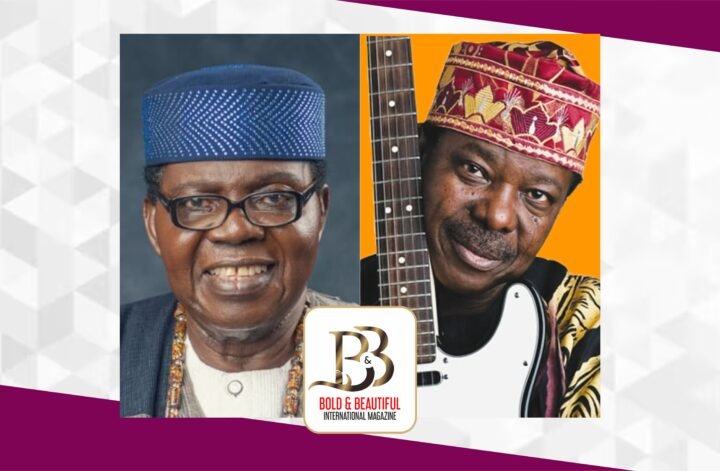I was raised in the vibrant melodies of the ’70s, ’80s, and ’90s music of Orlando Owo, Aina Omowura, Barrister, Ebenezer Obey, King Sunny Ade, Collignton, Funmi Aragbaye, Senwele Jesu, Amona, Bola Are, and the likes filled the eardrum of my childhood. While a mix of Ayinde Wasiu, Pasuma, Ayinde Barrister, and some foreign music echoed through my childhood and its neighbourhood. However, two names resonated above the rest—Ebenezer Obey and King Sunny Ade. Immersed in the eclectic mix of Nigerian musical legends, my ears were captivated, and my soul was stirred by the philosophical and spiritual musings of Obey and the guitar virtuosity and dynamic performances of King Sunny Ade.

Ebenezer Obey, born in 1942, and King Sunny Ade, born in 1946, stand as pillars in the Afro Juju genre. Obey, with a style uniquely blending highlife, gospel, and traditional Yoruba music, used his music not just for entertainment but as a vessel for moral and religious teachings. His lyrics became a cultural cornerstone, resonating with audiences as he traversed the realms of faith and entertainment.
In contrast, King Sunny Ade brought a different flavor to the scene. His juju music style, characterized by the extensive use of the guitar, talking drum, and accordion, introduced a distinctive sound. Sunny Ade’s prowess with the guitar became a hallmark of his performances, adding a layer of creativity that resonated with the youth of the ’80s.
While Obey’s lyrics leaned towards moral and religious teachings, Sunny Ade’s compositions delved into diverse themes, including love, social issues, and folklore. Their beats, rooted in Yoruba traditions, took on different tones, each focusing on individual messages. Sunny Ade’s guitar mastery often took center stage, driving the rhythm for dance and glee.

Both artists, leaders of the new school in their time, concurrently released popular songs, delighting millions of fans worldwide. The rivalry between them, a projection by fans and media, was debunked by Obey himself. He emphasized the importance of unity among musicians, seeing them as contributors to the growth of the Nigerian music industry rather than competitors.
Obey’s journey from the mid-1950s, starting with Fatai Rolling-Dollar’s band, showcased an evolution in style and instrumentation. His Inter-Reformers band skillfully incorporated Yoruba percussion styles and expanded with additional instruments, creating dance-floor compositions that praised affluent Nigerian socialites and business tycoons.

Sunny Ade, on the other hand, introduced the pedal steel guitar to Nigerian pop music, adding synthesizers, clarinets, vibraphones, and tenor guitars to the juju music repertoire. His band, the African Beats, embraced an improvisational style, using tight vocal harmonies and sophisticated guitar work.

As the years unfolded, both Obey and King Sunny Ade left an indelible mark on the global music landscape. Obey, having transitioned to gospel music in the late ’90s, continued his journey as a cleric, while Sunny Ade’s international success with albums like “Juju Music” and “Synchro System” earned him a Grammy nomination.

Their influence transcended musical notes. Obey and King Sunny Ade, once believed to be in rivalry, stood united in their contribution to Nigerian music. As the echoes of their timeless tunes continue to reverberate, a new generation of artists draws inspiration from the big band musical setups pioneered by these legends.
The harmonies crafted by Ebenezer Obey and King Sunny Ade remain etched in the cultural fabric of Nigeria, a testament to the enduring power of music to unite, inspire, and transcend generations.




